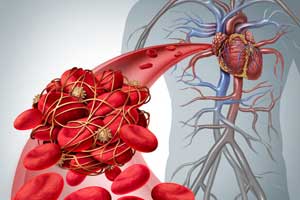- Home
- Editorial
- News
- Practice Guidelines
- Anesthesiology Guidelines
- Cancer Guidelines
- Cardiac Sciences Guidelines
- Critical Care Guidelines
- Dentistry Guidelines
- Dermatology Guidelines
- Diabetes and Endo Guidelines
- Diagnostics Guidelines
- ENT Guidelines
- Featured Practice Guidelines
- Gastroenterology Guidelines
- Geriatrics Guidelines
- Medicine Guidelines
- Nephrology Guidelines
- Neurosciences Guidelines
- Obs and Gynae Guidelines
- Ophthalmology Guidelines
- Orthopaedics Guidelines
- Paediatrics Guidelines
- Psychiatry Guidelines
- Pulmonology Guidelines
- Radiology Guidelines
- Surgery Guidelines
- Urology Guidelines
Net clinical benefit of anticoagulants for AF declines with age: Circulation Study

USA: Guidelines from esteemed organizations have recommended anticoagulation for all atrial fibrillation (AF) ≥75 years. Challenging these recommendations, a recent study has found that the net clinical benefit (NCB) of anticoagulation for atrial fibrillation decreases with advancing age. As with increasing age, the risk of death diminishes the NCB of anticoagulation for such patients.
Results of the study, published in the journal Circulation: Cardiovascular Quality and Outcomes, stresses on considering mortality risks while recommending anticoagulants to older adults with AF.
Atrial fibrillation is the most common heart rhythm disorder that can increase the risk of stroke and other cardiovascular diseases. Symptoms to include palpitations, racing or irregular pulse, shortness of breath, tiredness, chest pain and dizziness.
Patients age 75 and older are at higher risk for stroke and advised to use anticoagulants but till now, there is limited evidence on the net clinical benefit of anticoagulants in older adults. Sachin J. Shah, University of California, San Francisco, CA, and colleagues sought to determine the association between age and NCB of anticoagulation in older adults with AF.
The multi-institutional study of nearly 15,000 AF patients found that the anticoagulant warfarin was not beneficial after age 87 and another, apixaban, after age 92. As a result, physicians should consider all mortality risks, such as cancer and end-stage kidney disease, when recommending anticoagulants to older adults with AF, the researchers said.
"Many prior studies looking at the benefit of blood thinners found older adults benefit more than younger adults, but they narrowly focus on atrial fibrillation and strokes and don't account for all other health conditions affecting older adults," said Dr Shah. "Our study is the first to find that when taking these factors into consideration, anticoagulant benefit actually decreases with age."
In the CCQO study, the researchers reviewed the records of 14,946 adults from January 2006 to June 2009 in the Anticoagulation and Risk Factors in Atrial Fibrillation-Cardiovascular Research Network. They selected patients age 75 and older, with an average age of 81.
The researchers used a computerized decision-analytic model called the Atrial Fibrillation Decision Support Tool (AFDST), developed by the University of Cincinnati, to determine the potential benefit of anticoagulants. The model uses patient characteristics and guidelines on AF treatment from the American College of Cardiology, American Heart Association and Heart Rhythm Society to offer a recommendation.
The research team estimated the lifetime net clinical benefit of warfarin and apixaban relative to no treatment in quality-adjusted life years (QALY). QALY is a measure of disease burden that includes both the length of life and its quality, with one QALY equaling one year in perfect health.
Using 0.10-lifetime QALYs as the minimal net clinical benefit, warfarin started at 0.45 QALYs at age 75, then fell below 0.10 at age 87, while apixaban started at 0.74 QALYs at age 75, then fell below 0.10 at age 92.
Read Also: NSAIDs Plus Anticoagulants a Dangerous Combination for Atrial Fibrillation- RE-LY Trial
Key findings of the study include:
- In the main analysis, after age 87, NCB associated with warfarin decreased below 0.10 lifetime QALYs while NCB associated with apixaban did not decrease below 0.10 lifetime QALYs until after age 92.
- In sensitivity analyses, over a 3-year horizon, removing competing risks of death resulted in higher NCB (at 90 years, median difference using warfarin 0.010 QALYs, median difference using apixaban 0.025 QALYs.
Read Also: DOACs treatment in atrial fibrillation patients lowers fracture risk
"Competing risk of death is an important consideration when estimating the net clinical benefit of anticoagulation therapy," Shah said. "Failing to account for competing risks likely overestimates the net clinical benefit of anticoagulation, an effect that is more pronounced at older ages and with more effective anticoagulants."
"The NCB of anticoagulation decreases with advancing age. The competing risk of death diminishes the NCB of anticoagulation for older patients with AF. Physicians should consider competing mortality risks when recommending anticoagulants to older adults with AF," concluded the authors.
More Information: "Net Clinical Benefit of Oral Anticoagulation Among Older Adults With Atrial Fibrillation" published in the journal Circulation: Cardiovascular Quality and Outcomes.
DOI: https://doi.org/10.1161/CIRCOUTCOMES.119.006212
Journal Information: Circulation: Cardiovascular Quality and Outcomes
Dr Prem Aggarwal, (MD, DNB Medicine, DNB Cardiology) is a Cardiologist by profession and also the Co-founder of Medical Dialogues. He is the Chairman of Sanjeevan Hospital in Central Delhi and also serving as the member of Delhi Medical Council

Disclaimer: This site is primarily intended for healthcare professionals. Any content/information on this website does not replace the advice of medical and/or health professionals and should not be construed as medical/diagnostic advice/endorsement or prescription. Use of this site is subject to our terms of use, privacy policy, advertisement policy. © 2020 Minerva Medical Treatment Pvt Ltd